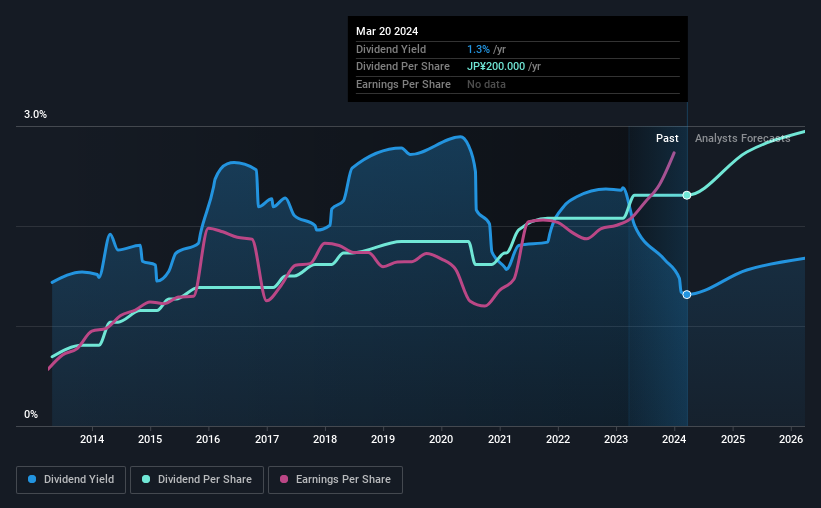
The board of Toyota Industries Corporation (TSE:6201) has announced that it will pay a dividend on the 27th of May, with investors receiving ¥100.00 per share. This means the annual payment will be 1.3% of the current stock price, which is lower than the industry average.
While the dividend yield is important for income investors, it is also important to consider any large share price moves, as this will generally outweigh any gains from distributions. Investors will be pleased to see that Toyota Industries' stock price has increased by 33% in the last 3 months, which is good for shareholders and can also explain a decrease in the dividend yield.
Check out our latest analysis for Toyota Industries
Toyota Industries' Dividend Is Well Covered By Earnings
While yield is important, another factor to consider about a company's dividend is whether the current payout levels are feasible. However, Toyota Industries' earnings easily cover the dividend. This means that most of what the business earns is being used to help it grow.
Over the next year, EPS is forecast to expand by 12.6%. Assuming the dividend continues along recent trends, we think the payout ratio could be 23% by next year, which is in a pretty sustainable range.

Toyota Industries Has A Solid Track Record
The company has an extended history of paying stable dividends. Since 2014, the dividend has gone from ¥60.00 total annually to ¥200.00. This works out to be a compound annual growth rate (CAGR) of approximately 13% a year over that time. It is good to see that there has been strong dividend growth, and that there haven't been any cuts for a long time.
The Dividend Looks Likely To Grow
Investors could be attracted to the stock based on the quality of its payment history. Toyota Industries has seen EPS rising for the last five years, at 11% per annum. A low payout ratio and decent growth suggests that the company is reinvesting well, and it also has plenty of room to increase the dividend over time.
We Really Like Toyota Industries' Dividend
In summary, it is good to see that the dividend is staying consistent, and we don't think there is any reason to suspect this might change over the medium term. The company is easily earning enough to cover its dividend payments and it is great to see that these earnings are being translated into cash flow. All of these factors considered, we think this has solid potential as a dividend stock.
It's important to note that companies having a consistent dividend policy will generate greater investor confidence than those having an erratic one. At the same time, there are other factors our readers should be conscious of before pouring capital into a stock. Companies that are growing earnings tend to be the best dividend stocks over the long term. See what the 14 analysts we track are forecasting for Toyota Industries for free with public analyst estimates for the company. Looking for more high-yielding dividend ideas? Try our collection of strong dividend payers.
Valuation is complex, but we're here to simplify it.
Discover if Toyota Industries might be undervalued or overvalued with our detailed analysis, featuring fair value estimates, potential risks, dividends, insider trades, and its financial condition.
Access Free AnalysisHave feedback on this article? Concerned about the content? Get in touch with us directly. Alternatively, email editorial-team (at) simplywallst.com.
This article by Simply Wall St is general in nature. We provide commentary based on historical data and analyst forecasts only using an unbiased methodology and our articles are not intended to be financial advice. It does not constitute a recommendation to buy or sell any stock, and does not take account of your objectives, or your financial situation. We aim to bring you long-term focused analysis driven by fundamental data. Note that our analysis may not factor in the latest price-sensitive company announcements or qualitative material. Simply Wall St has no position in any stocks mentioned.
About TSE:6201
Toyota Industries
Manufactures and sells textiles machinery, materials handling equipment, automobiles, and automobile parts in Japan, the United States, and internationally.
Excellent balance sheet average dividend payer.

